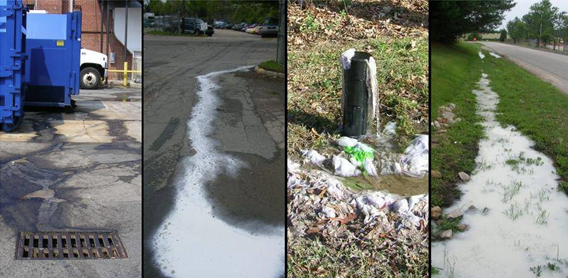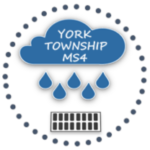Stormwater
What is an MS4?
A Municipal Separate Storm Sewer System (MS4) is a system of conveyances including roads with drainage systems, municipal streets, catch basins, curbs, gutters, ditches, man-made channels, or storm drains. As stormwater runs over driveways, lawns, and sidewalks it picks up debris, chemicals, dirt, and other pollutants.
Polluted stormwater runoff is often conveyed to MS4s and ultimately discharged into local rivers and streams without treatment. Anything that enters a storm sewer system is discharged into the water bodies we use for recreation and providing drinking water. Polluted runoff is the nation’s greatest threat to clean water.
 York Township is the owner of a Municipal Separate Storm Sewer System (MS4) that discharges to surface waters of the Commonwealth of Pennsylvania. Therefore, the Pennsylvania Department of Environmental Protection (PA DEP) requires that the Township obtain and comply with the requirements of a NPDES General Permit (PAG-13).
York Township is the owner of a Municipal Separate Storm Sewer System (MS4) that discharges to surface waters of the Commonwealth of Pennsylvania. Therefore, the Pennsylvania Department of Environmental Protection (PA DEP) requires that the Township obtain and comply with the requirements of a NPDES General Permit (PAG-13).
National Pollutant Discharge Elimination System (NPDES) Permit Updates
In September, the Township submitted an MS4 Annual Report which outlined the Township’s efforts to comply with the NPDES PAG-13 requirements from July 1, 2023 through June 30, 2024. To comply, the Township followed the PA DEP’s 6 Minimum Control Measure (MCM) protocols which included: Public Education and Outreach on Stormwater Impacts, Public Involvement/Participation, Illicit Discharge Detection and Elimination, Construction Site Stormwater Runoff Control, Post-Construction Stormwater Management in New Development and Redevelopment, and Pollution Prevention/Good Housekeeping for Municipal Operations.
To see the report select: Current MS4 Annual Report
On August 25, 2017, the Township submitted a Notice of Intent (NOI) for renewed coverage under PAG-13, and on December 16, 2020, it was approved by the PA DEP and the Township received its 2018-2023 permit.
In an effort to fulfill the Township’s pollutant reduction requirements, York Township joined a coalition of municipalities known as the York County Stormwater Consortium (YCSWC). The YCSWC worked together to develop and submit a York County Chesapeake Bay Pollutant Reduction Plan (YCCBPRP) which was also approved by the PA DEP on December 16, 2020. The YCCBPRP must include BMPs that will reduce pollutant loads to the Bay, as well as a schedule for their implementation.
To see the 2018-2023 York County Regional Chesapeake Bay Pollutant Reduction Plan, click here.
To see York Township’s Intergovernmental Cooperation Agreement for the Implementation of the York County Regional Chesapeake Bay Pollutant Reduction Plan, click here.
The Township encourages your participation in events to improve stormwater management, stream protection, and water quality.
Stormwater Hotlines
If stormwater runoff is “cloudy” or “dirty” and originated from an area of active earth disturbance, you will receive the quickest response by calling the York County Conservation District at (717) 840-7430. The District investigates all erosion and sediment control concerns for the Township. Please provide your name, address, telephone number where you can be contacted, and the specific location of the origin of the sediment laden runoff.
New stormwater regulations from Pennsylvania’s Department of Environmental Protection (DEP) requires York Township to investigate potential illicit discharges into our streams as well as other events adversely affecting water quality.
If you notice any of the following, immediately notify the Township by calling (717) 741-3861 x115 and/or call 911;
- Dumping, spills, or other illicit (illegal) discharge into storm sewers or streams
- Observed pollution event or pollutants entering a stream
- Dry weather flows from outfall pipes into streams (a dry weather flow is water observed flowing out of a pipe when there hasn’t been any rainfall for a period of 72 hours or more)
- Fish Kill
If the stormwater is “clear” and originated from stable areas where active earth disturbance is not occurring, you will receive the quickest response by calling York Township at (717) 741-3861 x115. Please provide your name, address, telephone number where you can be contacted, and the specific location of the origin of the stormwater runoff. Depending upon your description, the Department of Public Works or the MS4 Coordinator will investigate your concern. If the runoff originates from an area of active earth disturbance, the Township will refer it to the York County Conservation District.
What is an Illicit Discharge?
An illicit discharge is defined as any unauthorized discharge other than clean stormwater released into the Municipal Separate Storm Sewer System (MS4). Illicit connections may be intentional or may be the result of connections made years ago when water quality issues were not a concern.
The types of illicit discharges vary widely with some examples being:
- Waste oil, antifreeze, paint, trash or other household chemicals
- Car wash, laundry, and industrial wastewaters
- Pool water discharge (chlorinated and dechlorinated) – Tips for disposal by DEP can be found here
- Spills on roadways and other accidents
- Failing septic systems and illegal dumping practices
Common indicators of illicit discharges include abnormal odors, strange colors, or oil sheen present around or inside storm inlets or pipes. Keeping harmful substances out of our water benefits everyone; environmentally and economically.
Pool Water Discharge Management
Mandatory updates to the York Township Stormwater Management Ordinance (the Ordinance) in 2022 removed dechlorinated swimming pool discharges from the list of authorized non-stormwater discharges. What does this mean? Discharges of non-chlorinated swimming pool water directly to the storm sewer system, and ultimately to local streams, are no longer authorized by the Ordinance. Discharged pool water can contain chlorine or other chemicals that are harmful to our local waterways if not managed correctly. When draining a swimming pool this year, make sure to protect our local waterways by following these tips:
- Never dispose of pool water through a storm sewer, which will discharge to a stream.
- If lowering the water level of the pool, let it drain to a lawn to prevent it from running off into a storm sewer.
- Water may be used for irrigation if it does not run off the property or into a storm sewer.
- If the water cannot be disposed of by draining in your yard, you may need to hire a contractor to pump your pool into a water truck and dispose of it properly offsite.
Before you drain and/or close your pool for the year, please check out the Management of Swimming Pool, Hot Tub, and Spa Water Discharges publication by the Pennsylvania Department of Environmental Protection on how to properly manage your pool water discharge.
Car Washing
York Township's Stormwater Management Ordinance authorizes the discharge of water resulting from residential (not commercial) car washing to the MS4 only when cleaning agents are not utilized. The definition of “cleaning agent” is listed as “any product, substance or chemical other than water that is used to clean the exterior surface of vehicles.” What does this mean? Residential vehicle washing with cleaning agents is acceptable where the wash water would not flow into storm sewers. Residential vehicle washing without cleaning agents is also acceptable, even if the wash water enters the storm sewer.
IF YOU CHOOSE TO WASH YOUR CAR AT HOME, HERE ARE A FEW TIPS:
- Wash on grass or gravel, not on a paved driveway or street.
- Minimize the amount of water you use by using a hose nozzle with a trigger.
- Reduce the amount of soap you use.
- Do not rinse sponges and wash rags onto the ground but into buckets, then pour the buckets of soapy water down the sink or on grass when done.
Operation and Maintenance (O&M) Agreement for Stormwater Best Management Practices
When proposing private SWM BMPs, you will be required to complete, notarize, and record an O&M Agreement with York County. After recording, a copy of the receipt must be submitted to the Township to complete the process. Click here for a sample O&M Agreement that may require modification for your plan.
Do you own a Best Management Practice?
The Township, through our National Pollutant Discharge Elimination System General Permit, is required to see that privately installed, owned, and maintained Stormwater Best Management Practices (BMPs), such as seepage pits, infiltration pits, rain gardens, etc., are periodically inspected and maintained. Operation and maintenance (O&M) of a BMP is the responsibility of the property owner and any future property owner(s).
In order to fulfill this permit requirement, the Township has designed a program to not only verify proper O&M of all private BMPs, but to educate property owners about stormwater management. All BMPs are inventoried, and inspection packets are mailed by the Township to the respective property owner in a 5-year cycle which includes directions, contact information, and an educational brochure on the specific BMP being inspected. These are self-verified inspections, meaning the property owner performs the inspection (not the Township), and delivers the completed form back to the Township for reporting. Questions on this program can be directed to the MS4 Coordinator at (717) 741-3861 x115.
- Guidelines for Maintaining Streams in Your Community
- Be Wise When You Fertilize
- EPA Hazardous Materials Storage
- EPA Materials Management
- Floodplain Management Information
- Illicit Discharge Fact Sheet
- Lawns & Fertilizers
- Low-Impact Design Curbside
- PA DEP Erosion & Sediment Pollution Control Manual
- PA Stormwater Best Management Practices Manual
- Pervious Pavement
- Pet Waste
- Protecting Water Quality from Urban Runoff
- Rain Gardens
- Restaurants Food Services – Good Cleaning WQ Practices
- Wash Your Car the Smart Way!
- York Countywide Action Plan for Clean Water
- York Township Floodplain Management Ordinance
- York Township Stormwater Management Ordinance
- 2025 York Township Stormwater Business Flyer
- Alliance for the Chesapeake Bay
- Center for Watershed Protection
- Chesapeake Bay Program
- Codorus Creek Watershed Association
- Lower Susquehanna Riverkeeper
- Penn State Master Watershed Stewards
- Pennsylvania Department of Environmental Protection Homepage
- Pennsylvania Emergency Management Agency
- Stormwater PA
- US Environmental Protection Agency – Stormwater Page
- US Federal Emergency Management Agency
- Watershed Alliance of York (WAY)
- York County Conservation District
- York County Planning Commission
Stormwater Hotlines
See the Stormwater Hotline section to determine the appropriate option
Erosion & Sediment Control:
(717) 840-7430
Illicit Discharge Concerns:
(717) 741-3861 x115
General Stormwater Mgmt. Questions/Concerns:
(717) 741-3861 x115
Contact MS4 Coordinator
Phone: (717) 741-3861 x115
Email: Online Form
Contact Township Engineer
Michael Hiras, P.E.
Johnson, Mirmiran & Thompson (JMT)
220 St. Charles Way STE 200
York, PA 17402
Phone: (717) 741-1600

